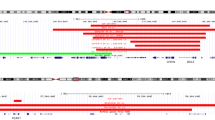Abstract
Background
Meckel–Gruber syndrome (MKS, OMIM #607361) is a rare pre- or perinatal lethal autosomal recessive ciliopathy caused by mutations in at least 12 known genes. It has a clinical and genetic overlap with other viable ciliopathies, especially Joubert syndrome and Joubert syndrome-related disorders. MKS is characterized by multicystic kidney dysplasia, central nervous system malformations (usually occipital encephalocele), ductal plate malformation of the liver, and postaxial polydactyly.
Case diagnosis
We identified a homozygous mutation in TMEM67 (MKS3) in a fetus affected by MKS; however, only the mother was a carrier of the respective mutation. Genotyping with polymorphic microsatellite markers and single nucleotide polymorphism (SNP) array revealed a maternal uniparental disomy (UPD) of the entire chromosome 8 (upd(8)mat), harboring TMEM67.
Conclusions
This is the first reported case of UPD as a cause of MKS. The possible underlying mechanisms for uniparental disomy (UPD) are reviewed. Even if rare, awareness of UPD and comprehensive work-up in the case of unexpected homozygosity for a recessive mutation is essential for accurate genetic counseling and assessment of the risk of recurrence.


Similar content being viewed by others
References
Salonen R (1984) The Meckel syndrome: clinicopathological findings in 67 patients. Am J Med Genet 18:671–689
Barisic I, Boban L, Loane M, Garne E, Wellesley D, Calzolari E, Dolk H, Addor MC, Bergman JE, Braz P, Draper ES, Haeusler M, Khoshnood B, Klungsoyr K, Pierini A, Queisser-Luft A, Rankin J, Rissmann A, Verellen-Dumoulin C (2015) Meckel-Gruber syndrome: a population-based study on prevalence, prenatal diagnosis, clinical features, and survival in Europe. Eur J Hum Genet 23:746–752
Knopp C, Rudnik-Schöneborn S, Eggermann T, Bergmann C, Begemann M, Schoner K, Zerres K, Ortiz Brüchle N (2015) Syndromic ciliopathies: from single gene to multi gene analysis by SNP arrays and next generation sequencing. Mol Cell Probes 29:299–307
Doherty D, Parisi MA, Finn LS, Gunay-Aygun M, Al-Mateen M, Bates D, Clericuzio C, Demir H, Dorschner M, van Essen AJ, Gahl WA, Gentile M, Gorden NT, Hikida A, Knutzen D, Ozyurek H, Phelps I, Rosenthal P, Verloes A, Weigand H, Chance PF, Dobyns WB, Glass IA (2010) Mutations in 3 genes (MKS3, CC2D2A and RPGRIP1L) cause COACH syndrome (Joubert syndrome with congenital hepatic fibrosis). J Med Genet 47:8–21
Iannicelli M, Brancati F, Mougou-Zerelli S, Mazzotta A, Thomas S, Elkhartoufi N, Travaglini L, Gomes C, Ardissino GL, Bertini E, Boltshauser E, Castorina P, D’Arrigo S, Fischetto R, Leroy B, Loget P, Bonnière M, Starck L, Tantau J, Gentilin B, Majore S, Swistun D, Flori E, Lalatta F, Pantaleoni C, Penzien J, Grammatico P, Dallapiccola B, Gleeson JG, Attie-Bitach T, Valente EM, Group IJS (2010) Novel TMEM67 mutations and genotype-phenotype correlates in meckelin-related ciliopathies. Hum Mutat 31:E1319–E1331
Patten MM, Ross L, Curley JP, Queller DC, Bonduriansky R, Wolf JB (2014) The evolution of genomic imprinting: theories, predictions and empirical tests. Heredity (Edinb) 113:119–128
Gardner RJMS, Grant R, Shaffer LG (2011) Chromosome abnormalities and genetic counseling. Oxford University Press, Oxford
Liehr T (2014) Uniparental disomy (UPD) in clinical genetics. Springer, Berlin Heidelberg
Yamazawa K, Ogata T, Ferguson-Smith AC (2010) Uniparental disomy and human disease: an overview. Am J Med Genet C Semin Med Genet 154C:329–334
Eggermann T, Soellner L, Buiting K, Kotzot D (2015) Mosaicism and uniparental disomy in prenatal diagnosis. Trends Mol Med 21:77–87
Richards S, Aziz N, Bale S, Bick D, Das S, Gastier-Foster J, Grody WW, Hegde M, Lyon E, Spector E, Voelkerding K, Rehm HL, ACMG Laboratory Quality Assurance Committee (2015) Standards and guidelines for the interpretation of sequence variants: a joint consensus recommendation of the American College of Medical Genetics and Genomics and the Association for Molecular Pathology. Genet Med 17:405–424
Engel E, DeLozier-Blanchet CD (1991) Uniparental disomy, isodisomy, and imprinting: probable effects in man and strategies for their detection. Am J Med Genet 40:432–439
Kotzot D, Utermann G (2005) Uniparental disomy (UPD) other than 15: phenotypes and bibliography updated. Am J Med Genet A 136:287–305
Karanjawala ZE, Kääriäinen H, Ghosh S, Tannenbaum J, Martin C, Ally D, Tuomilehto J, Valle T, Collins FS (2000) Complete maternal isodisomy of chromosome 8 in an individual with an early-onset ileal carcinoid tumor. Am J Med Genet 93:207–210
Vantaggiato C, Redaelli F, Falcone S, Perrotta C, Tonelli A, Bondioni S, Morbin M, Riva D, Saletti V, Bonaglia MC, Giorda R, Bresolin N, Clementi E, Bassi MT (2009) A novel CLN8 mutation in late-infantile-onset neuronal ceroid lipofuscinosis (LINCL) reveals aspects of CLN8 neurobiological function. Hum Mutat 30:1104–1116
Spence JE, Perciaccante RG, Greig GM, Willard HF, Ledbetter DH, Hejtmancik JF, Pollack MS, O’Brien WE, Beaudet AL (1988) Uniparental disomy as a mechanism for human genetic disease. Am J Hum Genet 42:217–226
Keren B, Chantot-Bastaraud S, Brioude F, Mach C, Fonteneau E, Azzi S, Depienne C, Brice A, Netchine I, Le Bouc Y, Siffroi JP, Rossignol S (2013) SNP arrays in Beckwith-Wiedemann syndrome: an improved diagnostic strategy. Eur J Med Genet 56:546–550
Author information
Authors and Affiliations
Corresponding author
Ethics declarations
Conflict of interest
The authors declare no conflict of interest.
Rights and permissions
About this article
Cite this article
Bruechle, N.O., Steuernagel, P., Zerres, K. et al. Uniparental disomy as an unexpected cause of Meckel–Gruber syndrome: report of a case. Pediatr Nephrol 32, 1989–1992 (2017). https://doi.org/10.1007/s00467-017-3710-8
Received:
Revised:
Accepted:
Published:
Issue Date:
DOI: https://doi.org/10.1007/s00467-017-3710-8




